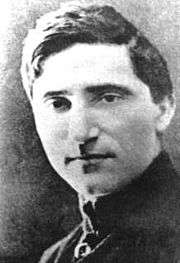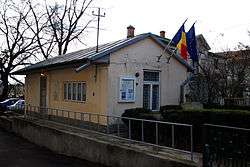George Topîrceanu


George Topîrceanu (Romanian pronunciation: [ˈd͡ʒe̯ord͡ʒe topɨrˈt͡ʃanu]; March 20, 1886 – May 7, 1937) was a Romanian poet, short story writer, and humourist.
Biography
Born in Bucharest, Topîrceanu began his schooling in the city, and then moved to the hilly countryside of the Argeş county, in the Șuici commune, where he formed his taste for themes taken from nature. After completing secondary studies, he attended the University of Bucharest Law School, and then its Faculty of Letters, without ever finishing either. This was largely due to a hectic lifestyle punctuated by numerous affairs and heavy alcohol use.
It is said that the origins of the Topîrceanu family are with a family Niștor from the village Topîrcea near Sibiu. It is possible that there is a relationship with the singer Lucreția Ciobanu (Arcaș). There is a family with the name Topîrceanu who claim to be related to the parents of George Topîrceanu, settled in Grădiștea (Călărași) and Periș near Snagov.
His debut came in 1905, the year he published his first verses in Sunday papers and minor magazines; in 1909, he managed to have poems featured in major periodicals, such as Sămănătorul. He worked in handcopying, and in 1909 made his mark by having his satirical Răspunsul micilor funcţionari ("A Reply from the Minor Civil Servants") in Viața Românească. In 1911 he moved to Iaşi, on Garabet Ibrăileanu's invitation, and became chief editor at Viaţa Românească. He later wrote his well-received articles - Cum am devenit moldovean ("How I Became a Moldavia Native") and Cum am devenit ieşean ("How I Became a Iaşi Native") which trace his meanderings within Romania.
In 1912, he married a young schoolteacher, Victoria Iuga. They had one son, Gheorghe. Although the two were very much in love, the marriage soon began to crumble, due to Topîrceanu's bouts of womanizing and alcoholism. Unable to redeem himself, George nonetheless suffered enormously, and the gradual distancing from Victoria, whom he will repeatedly refer to as his one saving grace, also influenced his literary output.
With the beginning of World War I, Topîrceanu was drafted, then caught and imprisoned by Bulgarian forces at the Battle of Turtucaia, in September 1916. He was kept in a POW camp until the end of the war, in 1918. After his return, Topîrceanu published a volume of wartime recollections - it is, among others, a vivid depiction of the profound effects that the cholera epidemic had on the morale of Romanian troops during their attempted retreat.
He began publishing short verses to increasing critical acclaim. In 1926, he was awarded the National Poetry Prize.
He died of liver cancer in Iaşi.
Works
Poetry

His three main volumes of poetry, Balade vesele şi triste ("Ballads, Merry and Sad"), Parodii originale ("Original Parodies") and Migdale amare ("Bitter Almonds"), are a compelling mixture of humor and delicate lyricism. Topîrceanu's favorite device is to switch, without warning, from biting sarcasm to genuine sentiment and vice versa, often with beguiling ease. In his own words he aimed to: through jest, render tears all too clear.
Topîrceanu's most celebrated pieces, such as Balada unui greier mic ("The Ballad of a Tiny Cricket") and Rapsodii de toamnă ("Fall Rhapsodies") can be enjoyed for their flowing verse, on an infantile level, as well as appreciated for carefully constructed metaphors, incisive humor and contemplative ambiance. Other, more muscular and less lyrical pieces such as Acceleratul ("The Bullet Train") and Cioara ("The Crow"), display his command of the Romanian language, with cascading similes and emphatic rhythms.
Prose
Topîrceanu wrote many satirical pieces, almost all first published as articles. His prose works were collected in several volumes: Memories from the Battle of Turtucaia (Bucharest, 1918), In their claw... Memories from Bulgaria and Light Sketches (Jassy, 1920), Letters with No Address, Humorous and Pessimistic Prose (Bucharest, 1930), Pirin-Planina, Tragic and Comic Episodes from Captivity (Bucharest, 1936). He also left an unfinished novella, Minunile Sfântului Sisoe ("Venerable Sisoes' Miraculous Works") published posthumously in 1938.
Presence in English language poetry anthologies
- Testament - Anthology of Modern Romanian Verse - second edition (bilingual version English/Romanian) - author and translator Daniel Ioniță, with Eva Foster, Rochelle Bews, and Prof.Dr.Daniel Reynaud - Editura Minerva, January 2015. ISBN 978-973-21-1006-5
External links
| Romanian Wikisource has original text related to this article: |
- Works by or about George Topîrceanu at Internet Archive
- Works by George Topîrceanu at LibriVox (public domain audiobooks)

|